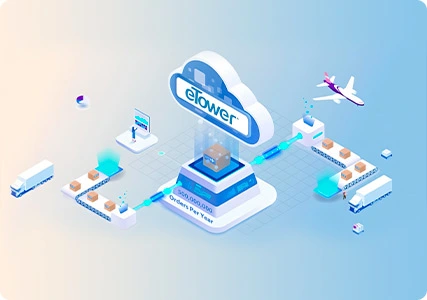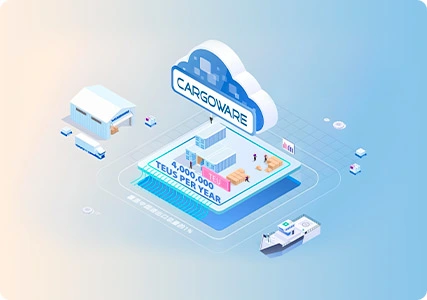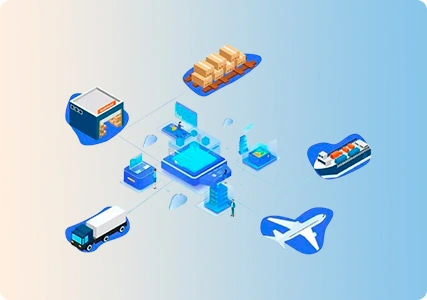All e-commerce business companies are competing with Amazon. It has been able to become the world's largest cross-border e-commerce retailer because customers like its logistics management system, which includes fast delivery, low shipping prices and easy returns. Amazon's logistics management services can offer these features to customers because it specializes in cross-border logistics management.
Amazon logistics management can quickly process orders, package parcels and deliver them to customers' doorsteps within a few days. If cross-border logistics providers want to compete with B2C logistics giants like Amazon, they need a cross-border e-commerce parcel logistics management system to help them reduce costs, speed up parcel order fulfillment and improve delivery.
What is cross-border logistics management?
Cross-border logistics management is the governance of the cross-border supply chain management function that helps organizations plan, manage and implement the processes of transporting and storing goods.
Cross-border logistics management activities typically include inbound and outbound transportation management, fleet management, warehousing, material handling, order fulfilment, logistics network design, inventory control, supply and demand planning, and management of third-party logistics service providers.
A cross-border logistics management system will benefit your business by providing your customers with a fast, high quality and accurate service that will improve your customer experience. It will also give you a better understanding of your supply chain, helping you to reduce costs and streamline your logistics strategy.
The importance of cross-border logistics management
Effective cross-border logistics management is important to cross-border e-commerce and cross-border logistics service companies for a number of reasons, both positive and negative.
Good cross-border logistics management ensures that products are transported in the most cost-effective, safe, efficient and timely manner. This saves companies money and makes customers more satisfied.
In contrast, poor logistics management can lead to damaged or delayed goods, which in turn leads to unsatisfied customers, returns and product scrap. The consequences of these problems include higher costs and customer relationship issues. To avoid these outcomes, effective logistics management includes careful planning, appropriate software system selection, proper vetting and selection of outsourcing suppliers, and adequate resources to handle the process.
Logistics management functions
To varying degrees, logistics management functions include customer service, sourcing and procurement, production planning and scheduling, and packaging and assembly. Logistics management is part of planning and execution at all levels, including strategic, operational and tactical.
In addition, it coordinates all logistics activities and integrates logistics activities with other functions, including marketing, sales, manufacturing, finance and information technology.
Logistics management processes
Logistics management usually consists of inbound and outbound logistics processes. Inbound logistics is the process of moving goods from suppliers to warehouses and then into production facilities to manufacture products. Inbound logistics can include raw materials, tools, components, office equipment and supplies. Outbound logistics is the process of removing finished goods from warehouse stock and shipping them to customers.
Here are some examples: For computer manufacturers, inbound logistics may involve electronic parts, computer chips, cables, connectors, moulded enclosures and shipping cartons. Outbound logistics involve finished computers and associated peripherals. Meanwhile, for a furniture manufacturer, inbound logistics may involve wood, glue, fabric, screws, nails, paint and safety glasses, while outbound logistics involves finished furniture.
The logistics process also includes reverse logistics, or the management of all functions used to return goods and materials. Reverse logistics takes goods from the customer or final destination and returns them to the originating organisation, where they can be reused, repaired, remanufactured or recycled.
How to manage logistics with logistics management software
Cross-border logistics management software includes functions and processes that enable logistics service providers to manage and execute the handling and delivery of product parcels sold across borders. The integrated functional platforms of cross-border logistics management software range from large ERP system logistics that contain comprehensive and integrated functions to specialist applications that handle only a few functions.
Logistics management functions that are part of a docked ERP system are often integrated with other business functions in the system, such as sales, finance, purchasing and human resources. More specialised logistics management software includes parcel operations management, transport management and last mile.
Some logistics management software is designed to be configured for individual industries, while others are industry-specific. Logistics management software usually starts with a local system, but now there are more cloud or hybrid cloud options available, with less latency, creating a close fit between the various modules of logistics, and integrating and managing third party logistics companies such as FedEx or UPS for cross-border logistics operations through logistics management software.
With eTower, you can improve delivery efficiency and help your business gain an edge by delivering products to customers faster than using other logistics providers. Sign up for a free trial of eTower and take control of your costs and customer experience with in-house delivery.
What are the modules that can be integrated into your logistics management software
Diversified Label Printing System
Diversified parcel delivery label printing. Allowing different custom parcel delivery label templates of the channel side to export templates, Allowing different custom parcel delivery label templates of the channel side to export templates, docking files, produce commercial invoices and bills.
Docking with operation station system
Docking with parcel operation station, monitoring parcel a-scan, parcel scan, parcel weighs, parcel sorting, parcel package, and other data in real- Implement complex parcel sorting logic and mobile operations.
lntegration systems
Parcel delivery system integrating all cross-border collaboration partners in the parcel delivery system supply chain to achieve data docking. real- time order data monitoring return. time order data monitoring return.
Tracking and monitoring the parcel path system
Tracking and monitoring the parcel path, and updating the parcel information in real time.
Channel routing system
Channel routing, multi-channel supplier selections, parcel transparent price, achieving the parcel delivery optimal pricing standard.
Warehouse system
Bonded parcel warehouse, Overseas warehouse parcel transport and parcel FBA replenishment management etc. Parcel delivery system business requirements, optimize business timeliness.
Business models system
Parcel delivery system business models such as International express integration, cross-border small parcel integration, Domestic fulfillment order management and cross-border e-commerce service integration etc., and also provide custom development services.
Monitor abnormal parcel system
Monitor abnormal parcels in real-time and provide corresponding solutions in time.
The best logistics software
The logistics management system is a form of enterprise resource planning for logistics services, customized for logistics purposes. It integrates the various system applications and product data processing for logistics processes and provides "digital supply chain" services specifically for logistics purposes. In short, logistics software provides an ERP system for logistics purposes. It is essentially the software of a logistics service provider.
Admittedly, it is difficult to say that a particular logistics management software system is the best. Nevertheless, an overview of the features of these companies' logistics management software may help guide potential consumers in determining their first choice.
eTower's leading integrated cloud business software suite includes business accounting, ERP, CRM, and e-commerce software. This shows that it is explicitly used for logistics and the division of functions is more biased towards logistics classification than generic ERP and CRM systems.
eTower logistics management system helps companies around the world to allocate and track their local deliveries, communicate with their drivers and customers, and rapidly scale their delivery operations
eTower can improve logistics management efficiency and reduce communication costs in the logistics process, combining email, apps and teammates into one view of the customer communication platform.









